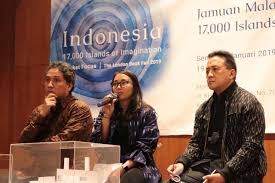
The London Book Fair is one of the largest annual gatherings for the book industry, particularly for agents and publishers looking to trade in international rights. Between March 12 – March 14, attendees who were not sitting in the Rights Hall or dashing to meetings sat in on seminars, strolled the booths, and met colleagues from around the globe who also made the trip to Olympia London.
Where the Book World Comes to Meet

Each year, the London Book Fair focuses on a particular market from around the world. This year the spotlight was on Indonesia. Made up of thousands of islands and religiously diverse, Indonesia was able to showcase their books and culture to a global audience. The Indonesian book market is as diverse as its many thousands of islands, titles are produced in many different languages, and few are translated into English. Theirs is a growing market, with an increasing international presence. Fiction – short stories, in particular – are popular in Indonesia. Indonesian readers read across a broad number of topics, but myths, spirituality and beliefs seem to be at the forefront of Indonesian publishing.
Throughout the Fair, we found that the most prevalent theme was inclusivity. Genres and formats that are growing in the industry are the ones best able to connect with a diverse audience. By making the publishing industry more diverse, it takes steps to become more inclusive.
Diversity refers to the different kinds of people who are involved in an industry, or the different kinds of stories that are told. Inclusion refers to an overall atmosphere that is welcoming to different kinds of people, including those who have been traditionally marginalized within the industry.
Diversity
One of the biggest aims of the publishing industry over the last few years has been that of creating books with more diverse characters, written by more diverse authors. Whilst the industry is heading towards having greater diversity, there is more that needs to be done. Actor, author, and TV presenter Cerrie Burnell highlighted, during the Diversity: Where’s the Issue panel, that diversity within books, children’s books in particular, needs to be more normalized. She said it should be as “normal as observing it when living and walking around London.” Author and illustrator Rose Robins took a similar stance, suggesting that neurodiverse characters should be included more in literature, rather than treated as plot devices. (That’s one of the reasons we loved The Kiss Quotient – check out our recent case study here!)
To connect with audiences from different backgrounds, the publishing industry needs to become more diverse as a profession, in addition to publishing more books with more diverse characters. Speakers from HarperCollins, SAGE Publishing, and EW Group touched on this in their panel on building a more diverse and inclusive industry. Efforts to make publishing houses more diverse need to start from the recruitment stage to keep the industry vibrant.
Poetry
At LBF19, we saw that poetry is on the rise. Poetry sales in January 2019 were at an all-time high, growing by 12% according to Nielsen Bookscan. The recent success of poetry has been attributed to its being more inclusive and diverse than other book genres, with more young people than ever buying and engaging with poetry. The success of Rupi Kaur, writing about her experience as a woman and as a daughter of immigrants, as well as Charly Cox, indicates that there is a huge audience eager to see themselves reflected in the books that they read. And with platforms like Instagram, poets have new ways of reaching younger, digitally engaged audiences. More traditional forms have also found a new audience, with Robin Robertson’s The Long Take the first work of poetry to be nominated for the Man Booker Prize. Sales of poetry have been building for the past few years, and it looks like 2019 will continue to see an upsurge of interest in the popularity of poetry.
Audiobooks
Unsurprisingly, of all the formats discussed at the London Book Fair audiobooks continues to be on everyone’s radar. According to Nielsen figures the sales of audiobooks have increased by 87% in the UK since 2014. The popularity of audiobooks has been linked to the trend of podcasts and engaging young men in particular with a different format of reading. But audiobooks have seen a rise overall and the boom seems set to continue for 2019 and onwards. (Check out some of our podcast coverage here.)
Nonfiction
Nonfiction is also a hot topic, as both adult and children’s nonfiction sales have increased in the last year. For adult nonfiction, a large proportion of the success comes down to feminist titles and inspiring books such as Slay in Your Lane by Yomi Adegoke and Elizabeth Uviebenene, Bloody Brilliant Women by Cathy Newman and Dolly Alderton’s Everything I Know About Love. As nonfiction has become more diverse in its scope, it has drawn in new audiences.
We were encouraged to see the book industry slowly moving towards being more inclusive, with publishers and authors having great successes on more diverse books. Different formats and genres are reaching new audiences and encouraging a whole new generation of readers.Keep up with the rest of our conference season coverage by subscribing to NetGalley Insights!

3 thoughts on “London Book Fair: Making a more inclusive book industry”